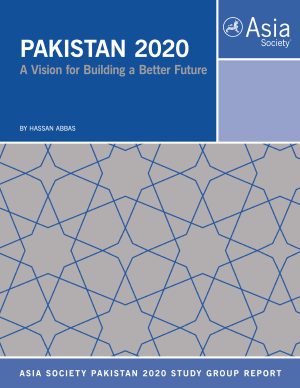 (Editor’s Note: The Asia Society today launches a new study group report on Pakistan titled “Pakistan 2020: A Vision for Building a Better Future.” In this essay, first published at CNN.com, Dr. Hassan Abbas, the Project Director for this Study, highlights his own personal thoughts on the report and its findings. Full report can be accessed here. A video of the panel discussion at the launch of the report is available here).
(Editor’s Note: The Asia Society today launches a new study group report on Pakistan titled “Pakistan 2020: A Vision for Building a Better Future.” In this essay, first published at CNN.com, Dr. Hassan Abbas, the Project Director for this Study, highlights his own personal thoughts on the report and its findings. Full report can be accessed here. A video of the panel discussion at the launch of the report is available here).
In recent years Pakistan has stumbled from one crisis to another. Reeling from a deadly insurgency on the country’s western border, its democratic government has struggled to establish even a modicum of stability. The people of Pakistan have shown amazing resilience even as they face rising terrorist activity, severe economic distress and perennial regional tensions.
That Osama bin Laden was hiding in plain sight in a compound less than a mile from Pakistan’s national military academy is troubling, to say the least. If Pakistan’s intelligence missed him completely, then it was a case of criminal negligence. If there was collusion of some sort, that will be an even more dire piece of news.
Yet Pakistan needs more attention and understanding from its most important ally, the United States, and from the rest of the world. Now is not the time for the world to turn its back on Pakistan.
Pragmatic and durable policy options aimed at improving Pakistan’s prospects with a long-term vision are needed. A new Asia Society study group report attempts to provide them, drawing on the insights and guidance of 30 Pakistani and U.S. scholars, former senior officials and experts.
Some of the major recommendations of the report, titled “Pakistan 2020: A Vision for Building a Better Future,” are:
- The process of democratization must continue, as there is no other way to expand civilian control over all institutions of the state. Pakistan has been ruled by generals for half its history — another military takeover would set the country back yet again.
- Pakistan’s military expenditures should be made more transparent, and there should be an increased civilian role in defense spending and security policy decisions.
- Independence of the judiciary — a major Pakistani achievement in recent years — needs to be further strengthened through respect for the separation of powers enshrined in the constitution and by providing financial autonomy to the country’s judicial institutions.
- To fix the education system, spending on schools needs to rise from less than 1.5% to at least 4% of gross domestic product — so girls don’t drop out, boys don’t end up in radical madrassas, and Pakistan overall can take part in Asia’s boom.
- Along with proper upkeep of existing hydropower dams, more dams are needed to meet Pakistan’s current and future energy requirements.
- Without a drastic overhaul of law enforcement, Pakistan’s internal security situation could worsen further. Major financial investment is needed — for example, half of U.S. funding allocated for counterterrorism and counterinsurgency support could be directed toward enhancing the forensic capabilities of law enforcement and supporting scientific investigations.
- Pakistan must diligently pursue a peace settlement with India, and increased economic interactions with India will expand the space for a peace constituency in the country.
While Pakistan has a reputation as a source of instability in South Asia, it also holds the key to peace in the future. Declaring Pakistan a failed or failing state resolves little. By helping Pakistan remedy its dysfunctions, its friends and allies can help ensure better prospects for all of us.
(The Pakistan 2020 Study Group included former diplomats, military leaders, and intelligence officials, journalists and media personalities, economists and development specialists, scientists, and experts in the fields of health, education, governance and law, and natural resources and the environment. In addition to Hassan Abbas, the Project Director, the group also included: Samina Ahmed, Graham Allison, Peter Bergen, Christopher Candland, Stephen Cohen, Suzanne DiMaggio, Asad Durrani, C. Christine Fair, Asher Hasan, Andrew Hess, Pervez Hoodbhoy, Robert Hsu, Mir Ibrahim, Asma Jahangir, Jehangir Karamat, William Milam, Adil Najam, Director, Nigar Nazar, John D. Negroponte, Sania Nishtar, Amir Rana, Ahmed Rashid, Eric Rosenbach, Babar Sattar, Ayesha Siddiqa, Shirin Tahir-Kheli, Frank Wisner, Moeed Yusuf, Mariam Abou Zahab, Mosharraf Zaidi, and Nasim Zehra.)



















































@ally. We shall never give up on Pakistan. it is only a matter of time that we set our relations strate with all countries close to us and far from us.
We need to do this ourselves, and NOT with outside help… it is outside help and attention that is one of the factors of us getting to where we ave gotten!
Remember that poem by Allam Iqbal… Khudi ko kar buland itna….
Only we can change our destiny!!!!
Good luck Pakistan, you can do it.
Unless the military comes under total civilian control, none of these recommendations will make a difference.
That part was enough for me stop reading further. If we have not realized until now that US is not our friend then Allah help us!
Just my 2 cents…